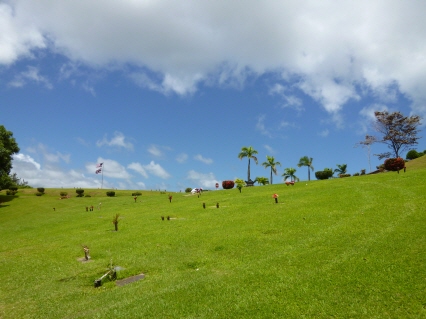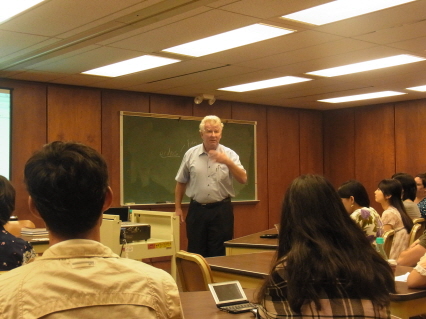[Report] UT-UH Summer Residential Institute for Comparative Philosophy (5)
Ravishing scenery, fresh breeze and gentle rain we had experienced during the past 10 days perfected the summer institute together with conflicting philosophical ideas. Now we have come to the last two days of the second week. Here is the report of August 9th and 10th.
August 9th (Thursday):
The morning lecture given by Professor Kajitani focused on “philosophy of bodily existence in the social world” as the interpretation of Yojokun went further.
Professor Kajitani introduced the notion in Yojokun that the body of human being is from parents and kept by Heaven and Earth which seems to be a coherent idea with Confucianism. By raising a question concerning the relationship between body and mind in nurturing life, he evoked our thoughts on both philosophy and medical science.
After lunch, the fifth lecture given by Professor Ames continued talking about Daoism with today’s emphasis on Zhuangzi. Presenting considerable quotations from the well-known Daoism Canon Zhuangzi, Professor Ames questioned why Daoist text introduced the neologism zhenren 真人 as an alternative to shengren 圣人(聖人) and junzi 君子, or to say what genuineness means in Daoism. In order to answer the above questions, we have to take the relationship between human and heaven as Zhuangzi observed into consideration. Then it came to the interpretation of the never-to-be-forgotten “episode” in Zhuangzi, the “happy fish.” As Godo Wakako has mentioned at the last report, participants were divided into five groups of three, allocated with a mission to give a brief presentation of each essay regarding Zhuangzi’s “happy fish.”
The last half of the lecture saw our presentations go rather smoothly. Not being limited to what those five essays talk, participants summarized the main ideas of multi-lingual materials adding their own understanding colored by various philosophical focal points. It was the first time that Professor Ames had sat beside and we students had taken the chance to arrange how the lecture went on. It was a precious experience for everyone and a great honor at the same time.
August 10th (Friday):
The morning lecture given by Professor Nakajima changed the subject today as Xunzi’s 性惡論 (The evil of human nature) is introduced. Unlike Mengzi’s 性善論 (The goodness of human nature), Xunzi insisted an absolutely opposite idea following the argument that we have to get rid of human desires, suggesting a close connection with Zhuangzi’s transformation or “化性”in Xunzi’s own words. Applying all these to politics, Xunzi’s thoughts are considered to emphasize on plurality, historicity and communicability with others according to Professor Nakajima.
The afternoon lecture on Nishida’s Inquiry into the Good led by Professor Ishida went on talking about the Kyoto School and their pretty Japanese or Nishidian ideas. The core notion Pure Experience remained to be pivotal. As the world outlook of Nishida was unfolded, the lecture became more and more interesting with quite a few participants raising questions actively.
Then it came to the end of this week, and everyone seemed to be enjoying the summer institute quite a lot. Moreover the approaching weekend we spent together at the North Shore and others left us an unforgettable memory and concluded the last weekend in a fascinating way.

(Report: RUI Xue)







